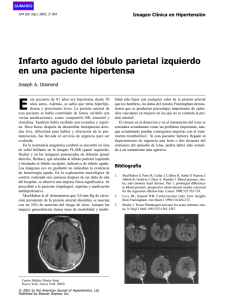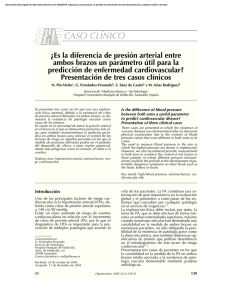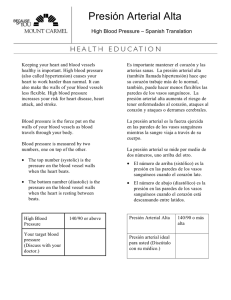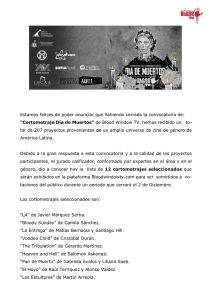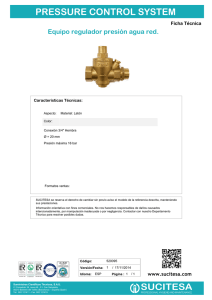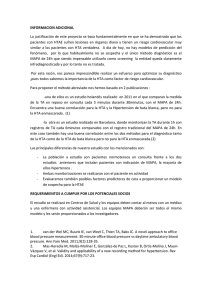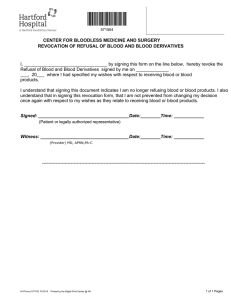What every Hispanic/Latino should know about high blood pressure
Anuncio
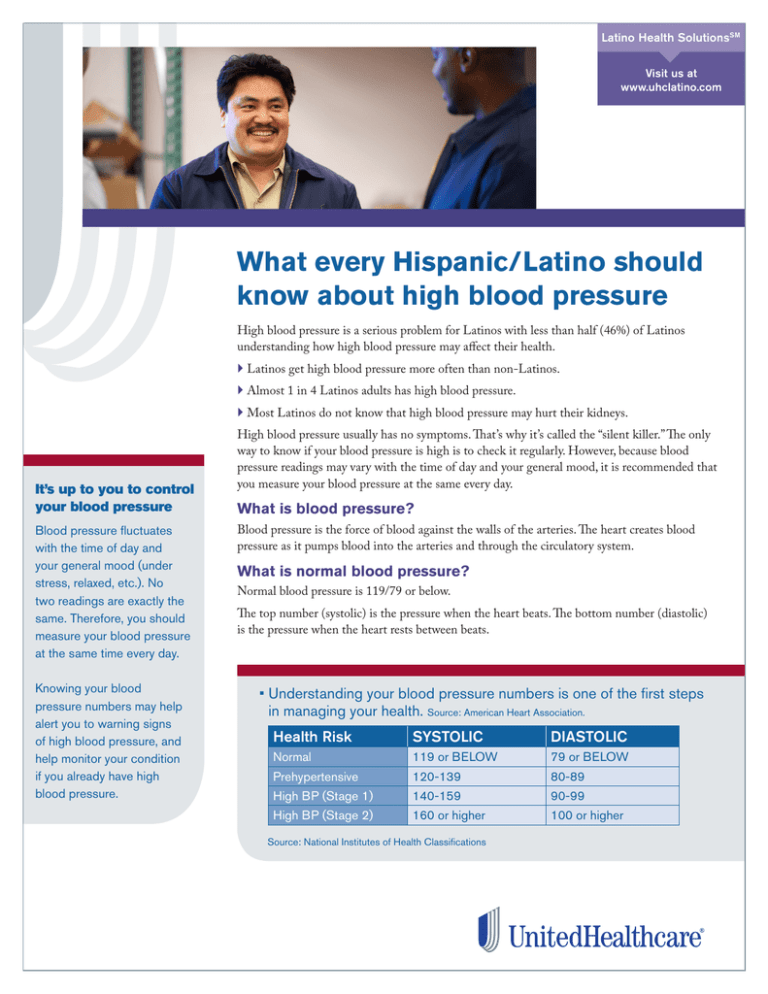
Latino Health SolutionsSM Visit us at www.uhclatino.com What every Hispanic/Latino should know about high blood pressure High blood pressure is a serious problem for Latinos with less than half (46%) of Latinos understanding how high blood pressure may affect their health. Latinos get high blood pressure more often than non-Latinos. Almost 1 in 4 Latinos adults has high blood pressure. Most Latinos do not know that high blood pressure may hurt their kidneys. It’s up to you to control your blood pressure Blood pressure fluctuates with the time of day and your general mood (under stress, relaxed, etc.). No two readings are exactly the same. Therefore, you should measure your blood pressure at the same time every day. Knowing your blood pressure numbers may help alert you to warning signs of high blood pressure, and help monitor your condition if you already have high blood pressure. High blood pressure usually has no symptoms. That’s why it’s called the “silent killer.” The only way to know if your blood pressure is high is to check it regularly. However, because blood pressure readings may vary with the time of day and your general mood, it is recommended that you measure your blood pressure at the same every day. What is blood pressure? Blood pressure is the force of blood against the walls of the arteries. The heart creates blood pressure as it pumps blood into the arteries and through the circulatory system. What is normal blood pressure? Normal blood pressure is 119/79 or below. The top number (systolic) is the pressure when the heart beats. The bottom number (diastolic) is the pressure when the heart rests between beats. •U nderstanding your blood pressure numbers is one of the first steps in managing your health. Source: American Heart Association. Health Risk SYSTOLIC DIASTOLIC Normal 119 or BELOW 79 or BELOW Prehypertensive 120-139 80-89 High BP (Stage 1) 140-159 90-99 High BP (Stage 2) 160 or higher 100 or higher Source: National Institutes of Health Classifications How does high blood pressure affect the body? Over time, high blood pressure may damage blood vessels in various parts of the body. And the longer it’s left untreated, the more likely it is that organs such as your heart, brain, kidneys or eyes will be damaged. This can lead to heart attack, stroke, kidney disease and blindness. What can I do to help achieve or maintain a normal blood pressure range? While you can’t control heredity, you may control the risk factors associated with high blood pressure. First, work with your doctor to determine the best treatment for you. Lose weight if you’re overweight E at healthy foods low in saturated fat, trans fat, cholesterol and salt E at a diet that emphasizes fruits, vegetables and low-fat dairy products Men tend to develop high blood pressure earlier in life than women. Limit alcohol to no more than one drink a day Source: American Heart Association For more health and wellness information, please visit www.uhclatino.com, or add the Mobile Website to your mobile desktop using your iPhone or Android smartphone. App Store is a service mark of Apple, Inc. Android is a trademark of Google, Inc. This information was prepared solely for general educational purposes. If you have specific questions about the topic(s) featured in this flier or about other health conditions, see your doctor. Insurance coverage provided by or through UnitedHealthcare Insurance Company or its affiliates. Administrative services provided by United HealthCare Services, Inc. or their affiliates. 100-7518ES 7/14 © 2014 United HealthCare Services, Inc. UHCEW665103-000 En espanol Lo que todo hispano o latino debe saber sobre la presión arterial alta La presión arterial alta es un problema grave para los latinos, ya que menos de la mitad (el 46%) de los latinos sabe cómo la presión arterial alta puede afectar su salud. Los latinos son más propensos a tener presión arterial alta que las personas que no son latinas. Casi 1 de cada 4 adultos latinos tienen presión arterial alta. La mayoría de los latinos no sabe que la presión arterial alta puede dañar los riñones. El control de la presión arterial está en sus manos La presión arterial cambia según la hora del día y su estado de ánimo general (estresado, relajado, etc.). No tendrá exactamente los mismos resultados cada vez que se tome la presión. Por lo tanto, debe tomarse la presión a la misma hora todos los días. Saber cuáles son sus valores de presión puede servirle para reconocer las señales de advertencia de la presión arterial alta y ayudarle a controlar su condición si usted ya tiene presión arterial alta. La presión arterial alta generalmente no produce síntomas. Por eso le dicen el “asesino silencioso”. La única manera de saber si usted tiene presión arterial alta es controlarla periódicamente. Sin embargo, dado que los valores de presión arterial pueden variar según la hora del día y su estado de ánimo general, se recomienda que se tome la presión a la misma hora todos los días. ¿Qué es la presión arterial? La presión arterial es la fuerza que ejerce la sangre contra las paredes de las arterias. El corazón genera presión arterial cuando bombea la sangre a las arterias y por el sistema circulatorio. ¿Cuál es la presión arterial normal? La presión arterial normal es de 119/79 o menos. El primer número (presión sistólica) es la presión cuando late el corazón. El segundo número (presión diastólica) es la presión cuando el corazón descansa entre latidos. • Conocer sus valores de presión arterial es uno de los primeros pasos para controlar su salud. Fuente: American Heart Association. Riesgo para la Salud PRESIÓN SISTÓLICA PRESIÓN DIASTÓLICA Normal 119 o MENOS 79 o MENOS Prehipertensión 120-139 80-89 Presión Arterial Alta (Etapa 1) 140-159 90-99 Presión Arterial Alta (Etapa 2) 160 o más 100 o más Fuente: National Institutes of Health Classifications ¿Cómo afecta la presión arterial alta al cuerpo? Con el tiempo, la presión arterial alta puede dañar los vasos sanguíneos de diversas partes del cuerpo. Y cuanto más tiempo pase sin tratamiento, más probabilidades habrá de que se dañen órganos como el corazón, el cerebro, los riñones o los ojos. Esto puede llevar a un ataque cardíaco, un derrame cerebral, enfermedad renal y ceguera. ¿Qué puedo hacer para alcanzar o mantener la presión en un nivel normal? Aunque no se puede controlar la herencia, usted puede controlar los factores de riesgo asociados a la presión arterial. En primer lugar, trabaje con su médico para determinar cuál es el mejor tratamiento para usted. Si tiene sobrepeso, baje de peso Coma alimentos saludables con bajo contenido de grasas saturadas, grasas trans, colesterol y sal Siga una dieta que contenga muchas frutas, verduras y productos lácteos bajos en grasa Limite el consumo de alcohol a no más de una bebida por día Los hombres tienden a desarrollar hipertensión arterial antes en su vida que las mujeres. Fuente: American Heart Association Para obtener más información sobre salud y bienestar, visite www.uhclatino.com, o agregue el sitio web móvil a su escritorio móvil en su iPhone o teléfono móvil Android. App Store es una marca de servicio de Apple, Inc. Android es una marca comercial de Google, Inc. Esta información se preparó únicamente con fines de educación general. Si usted tiene preguntas específicas sobre los temas tratados en este volante o sobre otras condiciones de salud, consulte a su médico. La cobertura de seguro es proporcionada por o a través de UnitedHealthcare Insurance Company o sus afiliadas. Los servicios administrativos son prestados por United HealthCare Services, Inc. o sus afiliadas. 100-7518ES 7/14 © 2014 United HealthCare Services, Inc. UHCEW665103-000
